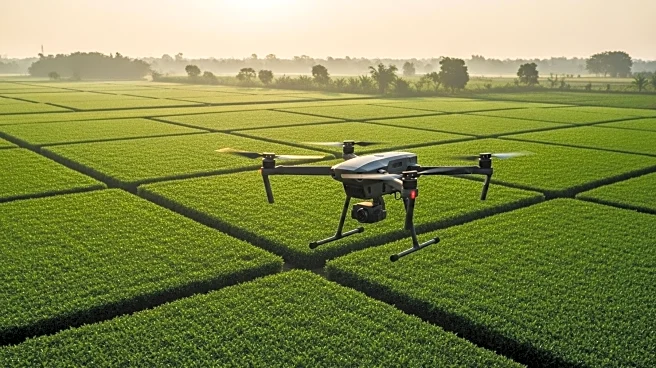What's Happening?
The Association of Equipment Manufacturers (AEM) has published a comprehensive study highlighting the economic and environmental advantages of precision agriculture in the United States. Collaborating with organizations such as the American Farm Bureau Federation and the National Corn Growers Association, the study reveals how technology adoption in farming is enhancing yields, reducing resource inputs, and bolstering the resilience of the U.S. food supply chain. Precision agriculture utilizes advanced technologies like GPS guidance, sensors, data analytics, and automation to optimize farming practices, thereby improving productivity and minimizing waste. Key findings from the report include an 8% reduction in fertilizer use, a 9% decrease in herbicide application, and significant fuel savings. Additionally, the study notes substantial water conservation, equating to the volume of 824,000 Olympic swimming pools, due to more efficient irrigation methods.
Why It's Important?
The findings underscore the transformative impact of precision agriculture on U.S. farming operations and sustainability efforts. By reducing chemical usage and conserving water, precision agriculture contributes to healthier soils and more responsible resource management, benefiting both farmers and society. The study presents a compelling case for advancing policies and investments that support precision agriculture, highlighting its potential to enhance food security and supply chain stability. As precision farming practices continue to scale, they promise to deliver extraordinary environmental and economic benefits, reinforcing the role of agricultural technology in shaping a sustainable future.
What's Next?
The report advocates for increased support and investment in precision agriculture technologies, suggesting that public policy should focus on promoting smart farming practices nationwide. As the adoption of precision agriculture grows, stakeholders may push for infrastructure development and policy frameworks that facilitate the integration of these technologies into mainstream farming operations. The study's findings could influence legislative agendas and funding priorities, encouraging further research and development in agricultural technology.
Beyond the Headlines
Precision agriculture not only offers immediate benefits in terms of resource conservation and yield improvements but also presents long-term implications for the agricultural sector. By fostering sustainable farming practices, precision agriculture can help mitigate environmental impacts and contribute to climate change adaptation strategies. The integration of technology in agriculture may also drive innovation and competitiveness in the sector, potentially leading to new business models and market opportunities.










